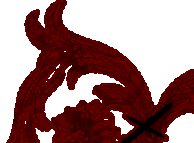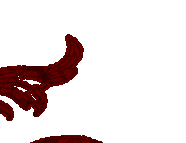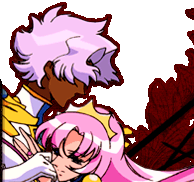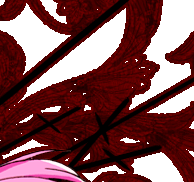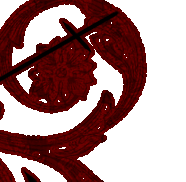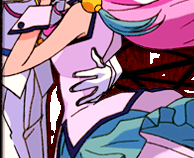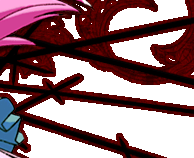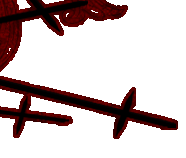
This analysis
was donated by Nicolas. The
song "Rondo-revolution" is an exceptionally intelligent
and beautiful piece. It’s a song that holds a lot more meaning
than many would assume. It is impossible to write about this song
and not write about the anime is was written for; "Shoujo Kakumei
Utena" because Makkun (Masami Okui) plays the part of its lead
character "Tenjou Utena" in the song, and its related
works in a truly extraordinary way. I will try and explain why I
believe this is so.
The
Title
To understand this song and its title you have to understand the
anime it was written for; "Shoujo Kakumei Utena". This
is rare. Even for an anime song, considering they usually have a
relevancy outside of the story they were written for. As is natural
when making music, you have to have some degree of mass-reliability
in the lyrics.
At first glance, you'd think "What a pointless thing to do!"
- but I think any song written for the anime "Shoujo Kakumei
Utena" (from now on referred to as "SKU") is the
exception. Most fictional stories are written in an 'outside-in'
structure, drawing people into the stories and creating their own
worlds. SKU is uncommon because it is very much an 'inward out'
story, relating its own events to those in the lives of the audience.
To be blunt, it may even be pushing it to call SKU a fiction, as
it’s a show about the process of human growth or the 'cycle
of life' with fantasy and Christian symbolism thrown into the mix.
Because the story is so real it is possible to write a song totally
dedicated to the story and still have it work on a mass-level. Whether
or not Makkun wrote it with 'mass' as well in mind, I do not know.
But either way, it works as a 100% "SKU" song and 100%
"mass song", like the anime works as a fantasy fiction
and documentary.
So let’s look at the title:
"Rondo-revolution" can have 3 meanings, none being particularly
wrong as such, although there is one I believe to be the most official
of the bunch. But more on that later.
It’s worth making note now that Kanji for "Rinbu"
is used to represent "rondo", so the song is supposed
to be called "Rondo-revolution". It’s not a tragedy
if the spelling "Rinbu-revolution" is used because in
the end the name is almost interchangeable, as I will cover. But
we know the song is "Rondo-revolution" due to Makkun saying
"Rondo-revolution" herself and indicating in furikana
that the kanji "Rinbu" is said "Rondo" in a
personally written liner-note for the single. (Thanks for indicating
that Kata.)
So why didn't Makkun just be direct? She certainly could have called
the song "Rondo-revolution" in three different ways and in
two languages. "Rinbukyoku-revolution", ("Rinbukyoku"
being the Japanese word for Rondo), "RONDO-revolution"
(RONDO being rendered in katakana / which is to write a foreign
word in a Japanese text - because 'rondo' itself is not a Japanese
word), or in English, 'Rondo-revolution". But she didn't. She
chose the kanji "Rinbu". Considering that she had several
ways of making it very clear the song was called "Rondo-revolution"
she seems to have deliberately chosen to use the kanji "Rinbu"
doesn't she? That is because the title is supposed to have another
dimension. The word "Rinbu" means to 'dance in a circle'.
I'm sure you all have seen various types of circle dancing, more
common a couple of hundred years ago in aristocracy at balls or
parties, and of course not forgetting various tribal dances. By
adding this meaning to the title Makkun is referring to the characters
in SKU using a circular dance as a metaphor for the endless struggle
of their lives, or the endless cycle of life itself.
So, the 'revolution' in the title must seem fairly straightforward
in comparison? It certainly appears so, but that starts to crumble
a bit when you consider how many meanings the word' revolution'
can have.
1. To change/destroy/break/revolutionize
2. To turn, to revolve, one turn, turning and so on..
Therefore the title in full can have four separate meanings!
1. 'The revolving circular dance'
2. 'Repeat of the repeating tune'
3. 'Revolutionizing the circular dance'
4. 'Revolution of the repeating tune'
As you can see, the 'revolution' in the title is also rather layered,
if not more so than 'Rinbu/rondo'. Now as I said, I don't think
there is a general 'one single right meaning' of the title but that
there is one that is readable as the overall main meaning, with
the others left open. I think that overall meaning is 4. "Revolution
of the repeating tune"
It’s using 'repeating tune' (the 'rondo' part) as a metaphor
for the endless repeat of human life (a strong theme in SKU) and
using 'revolution' in the sense of it being 'changed/broken'.
When broken down, "Rondo-revolution" means: 'Changing
the endless cycle of life'.
In the end, this interpretation song title is the story of SKU
more or less, which is why I am confident in this interpretation.
It’s no coincidence. (Please note, it is changing the cycle
of life in terms of 'altering its pattern' - not changing to totally
'wipe the cycle out', to create something else.) Interestingly,
I think this title doesn't bear much relevance to the lyrics. (of
course, its not to the point of irrelevance - it simply employs
a nice separation of 2 things Makkun wanted to illustrate).
Main Lyrics
I think Makkun played the role of Utena in this song, the Promotional
Video and single jacket quite clearly indeed.
In the verses, we're listening to Utena basically chatting to someone
she cared for who she has behind. I'm inclined to say Anthy - as
Utena references looking at a photo, its likely Utena and Anthy
took snaps during times they were having fun. I'd never rule out
Dios. I also have wondered if it might not also about the relationship
between 'Miki' and his sister, though that’s not as likely.
There are numerous reasons why you'd think that Makkun started
to play Utena referring to the past during the choruses. On first
appearances it appears that Makkun is playing the Utena 'mid-way'
in SKU but it is later revealed that this, like the song in general,
is the 'adult' Utena talking. She talks of using her past to help
her strip away her old self and be a free, strong adult. She repeats
the interesting statement that 'If we are ever separated I swear
I will change the world' - which sounds like Utena talking to "Dios"
or "Anthy" in her past, but it could also be Utena saying
this to herself. If she ever gets separated from her past, all the
development and memories that have made her what she is, she will
still carry on moving and progressing. That is the theme of the
song. Utena looking back on the entire story... and hints that reaching
adulthood is merely another revolution on an endless wheel of life,
as she talks of changing the world or revolutionizing again. As
I covered in the title itself, the infinite cycle of birth, growth,
death is the root of SKU, so this makes perfect sense.
Can't we say that, without a doubt, Makkun knew the story of SKU
comprehensively before writing this song? I wonder if she spent
time with Ikuhara or Saito. I'd certainly like to know more about
this song's production.
The Promotional Video
On first glance the "Rondo-revolution" PV seems to be
a fairly standard promotional video. Shot in an eye-catching location
(New York) with Makkun singing the song. This PV is not simple at
all. Makkun is playing the role of Utena as the adult Utena who
has broken out into the world and is living naturally. Why?
New York represents the 'big open world' to most humans doesn't
it? It’s not a particularly sheltered environment. Does Utena
not go out into the big wide world in the end? Would it not be vibrant,
busy and free? There's no coincidence – the setting was carefully
planned out. Why is Makkun doing so many 'everyday' things in this
PV? I think the level at which Makkun looks 'everyday' is more than
just a stylistic whim but almost necessitates the fact that she
is meant to be living there. She rides the subway, buys food, buys
and reads the paper, flips through magazines, putting make-up on
at a dressing table, gazing out of a window as she writes to someone…
These things are not something you do unless you are living somewhere,
at least for a while. The part where Utena is writing to someone
is something I can't settle on. I immediately think it’s someone
in Utena's past - but I can't decide who or what it represents to
a high enough degree. The PV as a whole, however, is excellent.
I think Makkun also appears as Utena on the single jacket. Of course,
the pink sweater is obviously a SKU reference. However, I don't
think it ends there. Colours are important in SKU to a degree that
goes beyond superficial colour/personality-type psychology. Pink,
of course, is Utena's 'colour' (as is white) – it’s
a statement that is bold in the series, understanding this makes
it clear Makkun is appearing as "Utena" – not as
severe as 'I am her!' of course. But in a cool, gentle, proud and
responsible manner. Just like Makkun.
So, I have come to the end of my article, which
has become very long! I hope it both illustrates the exceptional
level of skill Makkun employed in the song in both relating it to
SKU so carefully in the title and in her great success playing Tenjou
Utena. It really is more than just the 'catchy opener'.
 |

